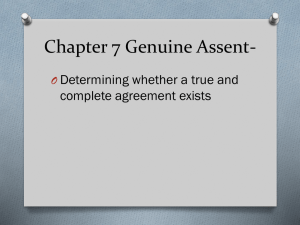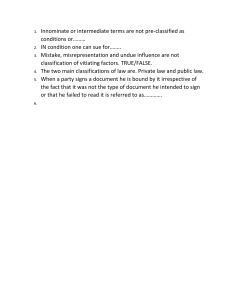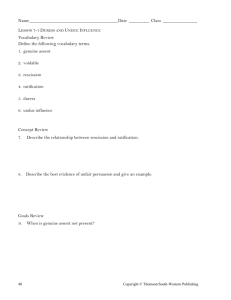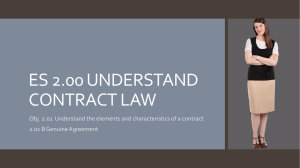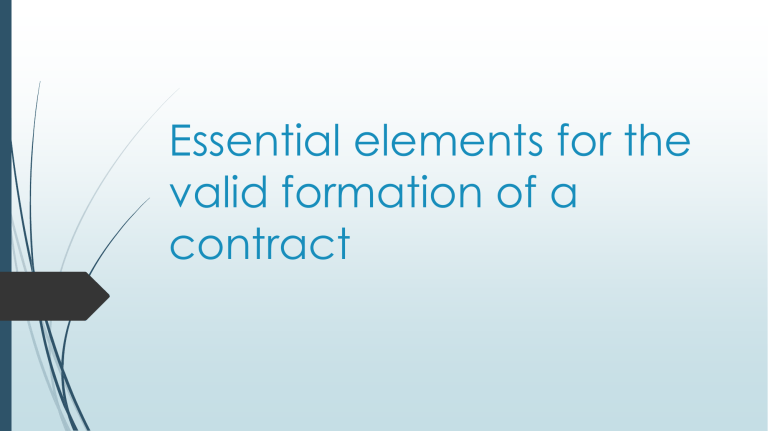
Essential elements for the valid formation of a contract Consideration “Some right, interest, profit or benefit accruing to one party, or some forbearance, detriment, loss or responsibility given suffered or undertaken by the other” (Currie v Misa 1875) A bargain consisting of mutual promises, both to be performed or exchanged around the same time – executory consideration; Consideration for the promise is an act already performed – executed consideration; If the act put forward as consideration was performed before any promise of reward was made it is not valid consideration – past consideration (but there are exceptions, e.g. in cases where there is an implied understanding that there would be some payment. Consideration a)Consideration must be of some value Some value is sufficient, it need not be proportionate bargaining The following will not suffice as consideration: i. Agreement to accept a lesser sum on contract of larger sum of money General rule: not binding unless fresh consideration given Exceptions: Smaller amount paid at creditor’s request on different terms; Composition agreement/ debt rearrangement scheme; Part payment made by third party on condition that debtor released; Equity: promissory estoppel Consideration ii. Promise to do what one can already legally demand e.g. workers’ obligation to do extra work during emergencies; iii. Promise to discharge duty imposed by law e.g. promise to compensate individual subpoenaed by a court of law. b) Consideration must move from the promise (privity of contract) Fundamental principle of English law; A person cannot be bound by or take advantage of a contract to which he was not a party; Exceptions: Assignment of rights; Trust Intention Objective test to determine intention to create legal relations; Intention may be negative by clause that it is a “goodwill agreement”; Commercial agreement: presumption of intention, unless: Mere puffs or exaggerations in advertisements; Agreement binding in “honour only”; Comfort letters by third parties, instead of formal guarantee. Social/ domestic agreements: presumption of no intention e.g. agreement that husband will pay wife housekeeping allowance However, a separation agreement would be binding: see Merritt v Merritt Capacity Generally, all persons have the power to enter into contracts. Exceptions: a) Minors – persons below the age of 18: The minor must be protected against his own inexperience; The law should not cause unnecessary hardship to those who deal with minors. i. Necessaries E.g. food, clothing, lodging, education or training in a trade and services; It should not contain onerous terms; The seller must prove: Items capable of being necessaries, and not luxury ones; Goods are necessary for the particular minor in question. essential Capacity S4 of the Sale of Goods Act Capacity to buy and sell (1) Capacity to buy and sell is regulated by the general law concerning capacity to contract, and to transfer and acquire property: Provided that, where necessaries are sold and delivered to a minor, or to a person who by reason of mental incapacity or drunkenness is incompetent to contract, he must pay a reasonable price therefor. (2) Necessaries in this section means goods suitable to the condition in life of such minor or other person, and to his actual requirements at the time of the sale and delivery. Minors ii. Beneficial contracts of service The law allows the minor to get into such a contract, provided that, taken as a whole, it is manifestly for his benefit; A minor will therefore not be bound if the contract is on the whole harsh or oppressive; Take note, though, of sections 21 and 22 of the Employment Act – prohibition against child labour (any child below the age of 14) and hazardous work Minors Iii. Acquisition of property with obligations E.g. a leasehold, or shares in a company - he is bound by the obligations as long as he retains the subject. He must pay the rent or calls on the shares: London & North Western Railway v M'Michael (1850) 5 Ex 114. The contract is voidable by the minor-he may repudiate it any time during his minority or within a reasonable time thereafter When a minor avoids a contract he escapes liability such as rent which are not yet due, but he can be sued for rent which is due. The minor cannot recover money which he has already paid unless there has been a total failure of consideration; e..g if he has attended meetings or received dividends (profits) on his shares, he cannot recover the amount already paid to the company Minors iv. Loans and Guarantee of a minor's contract Loans to minors are not binding unless ratified by the minor after reaching the age of 18. No new consideration is required for ratification. A guarantee by an adult of a minor's contract will be enforceable against the guarantor despite the fact that the main transaction cannot be enforced against the minor Minors The Effect of Equity on Minors’ Contracts Subrogation: if a minor borrows money to buy necessaries and he actually spends money for this purpose, the lender may “step into the shoes” of the seller and recover from the minor the reasonable price which the seller could have recovered. The lender is said to be subrogated to the rights of the seller Specific performance: this will not be granted to the minor, since equity will not grant it against a minor. The equitable maxim “equality is equity” applies Mental Disorder and Drunkenness If a person is temporarily incapable of understanding what he is doing because of mental illness, drunkenness or drugs the contract will be valid unless he can prove: That he did not understand the nature of the contract and, The other party knew or ought to have known of this disability Such a contract will be binding if it is later ratified at a time when the person is able to understand what he is doing. Where necessaries are sold and delivered to a person who by reason of mental incapacity or drunkenness is incompetent to contract, he is bound to pay a reasonable price. FORM OF A CONTRACT Generally, contracts can be in any form, except: Contracts which must be in the form of a deed: certain transactions involving land require the execution of a deed, i.e. conveyances, legal mortgages and leases for more than 3 years; Contracts which must be in writing: a contract for the sale or other disposition of land can only be made in writing; Contracts which must be evidenced in writing: a contract of guarantee must be evidenced in writing to be legally enforceable. GENUINENESS OF CONSENT 1. Mistake Common law The general rule of common law is that a mistake does not affect the validity of a contract – caveat emptor; The following mistakes, however, at common law, render a contract void: Mistake as to the existence of the subject matter: in Galloway v Galloway (1914); Mistake as to the possibility of performing the contract – e.g. failure of land to produce 50 tonnes of maize; Mistake as to the identity of the subject matter; Mistake as to the identity of the other party, but must prove the following: That at the time of the agreement he regarded the identity of the other party as of importance That he did not intend to contract with Y, but with a different existing person – Z, and That this fact was known to Y. Mistake Equity Equity will in limited situations relieve a party from the effects of his mistake where the common law would hold him to the contract. There are two equitable remedies: a) Rescission Provided the party is not at fault, and justice will be done to the other party by imposing conditions, see Grist v Bailey (1966); b) Rectification A mistake in the written document may be rectified, subject to conditions: i. The terms were clearly agreed between the parties; ii. The agreement continued unchanged up to the time it was put into writing, and iii. The writing fails to express the agreement of the parties. c) Specific performance The court may refuse to order this if it will be unfair to enforce it against the person who made a mistake Mistake 3. Non est factum The general rule concerning signed documents is that a person is bound even if he does not read or understand the document. However, an apparent signed contract will be regarded as void if a party can successfully plead the defence of non est factum (it is not my act). Three conditions must be satisfied: i. The signature must have been induced by fraud ; ii. The document must be fundamentally different from that thought to be signed. A mistake as to the contents is not sufficient to allow non est factum to be raised; iii. The party seeking to avoid liability must prove that he acted with reasonable care. See Lewis v Clay (1897) Misrepresentation A misrepresentation is an untrue statement of fact which is one of the causes which induces the contract; It must be a statement of fact; not opinion, intention or law ; Silence is not usually misrepresentation except: i. When a statement made in the course of negotiations subsequently becomes false and is not corrected, or; ii. When silence distorts a literally true statement - R v Kylsant (1931); or iii. Where the contract is of utmost good faith (uberrimae fidei), it imposes a duty of disclosure of all material facts because one party is in a strong position to know the truth, e.g. insurance contracts – Lambert v CoOperative Insurance Society [1975]. The misrepresentation must induce the contract. The plaintiff therefore cannot avoid the contract if: i. He knew the statement was false, or; ii. He would have made the contract despite the misrepresentation, or; iii. He did not know that there had been a misrepresentation. Fraudulent misrepresentation A statement which is known to be false, or made without belief in its truth, or recklessly, not caring whether it is true or false - Derry v Peek (1889) 14 App Cas 337. If the innocent party has suffered loss he may claim damages, based on the tort of deceit. In addition, he may: Refuse to perform the contract and Claim rescission of the contract. Since fraud makes a contract voidable, the innocent party may choose to affirm the contract. Negligent misrepresentation A negligent misrepresentation is a false statement made by a person who had no reasonable grounds for believing it to be true. The innocent party has a right to damages for misrepresentation if he has suffered loss. However, if the maker of the statement proves that he had reasonable grounds for believing, and in fact did believe, up to the time the contract was made that the facts represented were true, then he has a defence. The measure of damages is to put the plaintiff in the position which he would have been in if the representation had not been made Innocent misrepresentation An innocent misrepresentation is a statement which the maker honestly and reasonably believes to be true; The law attempts to strike a balance between two innocent parties, the maker of the statement and the person who has been induced to make a contract in reliance on that statement; The innocent party has no right to damages, but may ask the court to grant the equitable remedy of rescission, i.e. restoration, to the precontract state of affairs: The court has a discretion to award damages in lieu of rescission if it thinks it equitable to do so, for example, if the misrepresentation is trivial it may be too drastic to rescind the contract; As with fraudulent misrepresentation the innocent party may choose to affirm the contract. Misrepresentation Bars to rescission The remedy of rescission will not be available in the following situations: i. If the innocent party, with knowledge of his rights, affirms the contract; ii. Lapse of time: Where the misrepresentation is fraudulent, lapse of time does not itself bar rescission because time only begins to run from discovery of the truth; Where the misrepresentation is innocent, lapse of time may bar rescission (court may then award damages) Duress It is limited in scope to illegal violence or threats of violence to the person of the contracting party e.g. unlawful imprisonment; Cuming v Ince (1847): an old lady was threatened with unlawful confinement in a mental home if she did not transfer certain property rights to one of her relatives. Undue influence Consent may be affected by other influences other than physical ones; There will be a presumption of undue influence where there is a special relationship between the parties; the relationship is such that one of them is by reason of the confidence placed in him able to take unfair advantage of the other; Examples of such relationships are trustee/beneficiary, solicitor/client, and parent/child; The transaction must be to the manifest disadvantage of the person subjected to undue influence; However, the presumption will not arise if the person in whom confidence is placed keeps within the boundaries of a normal business relationship. Terms of a contract Express terms Distinguish between a term and a representation inducing the contract. It is likely a term if: made in latter stages of negotiations,; reduced to writing after it was made (regarded as important); the maker of the statement possessed special skill or knowledge than the other party (Oscar Chess v Williams [1957] 1 All ER 325 – buyer had special knowledge being car dealers, whereas the seller did not) If the maker suggests to the other to check the statement, then it is likely a representation. Conditions and Warranties Condition: Vital term going to the root of the contract; Normally entitles innocent party to cancel contract and claim damages. Warranty: Subsidiary to the main purpose of the contract; Breach only entitles the innocent party to damages. Classification as a condition or a warranty depends on the intention of the parties – see Schuler v Wickman Machine Tools [1974] AC 235; Inter-mediate or innominate terms do not express intention of the parties, and will be classified as either conditions or warranties depending on the seriousness of the breach If it goes to the root of the contract then it will be deemed to be a condition – see Hong Kong Fir Shipping [1962] 1 All ER 474. Incomplete contracts A legally binding agreement must be complete in its terms; An agreement for the balance of the price to be paid over two years on “hire purchase terms” is not an agreement - uncertain what terms were intended - Scammell v Ouston (1941); However, the parties may leave an essential term to be settled by specified means outside the contract, e.g.: open market price on date of delivery; arbitrator to determine a fair price; course of dealings between parties. Missing terms can be deduced from conduct of parties - Hillas v Arcos (1932) reference made to official price list where no price was mentioned for timber sale; Non- essential or inappropriate words can de disregarded - Nicolene v Simmonds (1953) a contract provided that the “usual conditions of acceptance apply”, but these disregarded as they did not exist, therefore meaningless. Standard form contracts Usually used by large organisations in their contracts with consumers; Also used in commercial transactions; Two major problems may arise in such contract: When words inserted in blank spaces are inconsistent with the printed words – usually the former will prevail – basic rule of construction: “particular overrides the general”; When both parties agree on their own standard terms - Butler Machine Tool Company v Ex-Cell-O Corporation (1979) held in favour of the buyer, as his terms of acceptance concluded the contract, therefore deemed to override terms of the offer. Implied terms Custom Presumption that parties conclude contract on prevailing customs in trade or locality, unless proved otherwise - British Crane Hire v Ipswich Plant Hire (1974) Courts Terms implied in fact: obvious and necessary to give contract business efficacy (“officious bystander” test) Terms implied in law: terms implied to maintain a standard of behaviour, e.g. in employment Implied terms: Statute Exemption clauses A term which seeks to limit or exempt party from liability on occurrence of particular event; Such a clause becomes a term of a contract by signing document or by notice: A person is bound by signed document even if s/he does not read it; A person will not be bound by a signed document if the other party misrepresented its terms; Reasonable steps must be taken to bring clause to party’s notice before the contract is concluded; The more outlandish the clause the more effort needed to bring it to the party’s attention; Reasonable notice of the liability conditions proposed by the clause must be given, otherwise the courts will not enforce it. Clause may apply where parties have had long and consistent dealings incorporating the same Limitations on exemption clauses Courts seek to balance between: Parties’ freedom to contract on any terms they wish; and Need to protect public from unfair exemption clauses in standard form contracts of large businesses As much as corporations should not use them to abuse bargaining power, they are important in allocating risk beforehand; They also make it possible to determine different rates depending on the risk borne by a party; Greater need to protect public against such clauses with big corporations, as opposed to contracts between corporation with equal bargaining power Discharge of a contract Performance Proper performance Each of the parties must carry out the obligations exactly as they agreed - Cutter v Powell [1795] 10 ER 573 Partial performance Promissor partly performs obligations; Inference made that fresh agreement between the parties – dependent on acceptance by other party; Based on quantum meruit principle Prevention of performance Other party is at fault, so quantum meruit principle applies Substantial performance Performed most of the obligations, but there are minor defects or omissions Contract price – cost of defects/omissions Breach of contract Breach of a condition entitles party to treat contract as coming to an end; The breach substantially deprives him of benefit of the contract; Repudiation by performance also entitles innocent party to treat contract as coming to an end: Party indicates by words or conduct that he will not perform; He does not honour obligations when due; Called anticipatory breach; Innocent party acquires immediate right to sue; Or else can wait until performance due and there is non-performance. Frustration Unforeseen contingencies may occur once contract concluded; Parties sometimes insert “force majeure”/hardship clauses to deal with such contingencies; otherwise the courts may imply the same – Taylor v Caldwell (1863) 3 B & S 826 – hall accidentally destroyed by fire; The court will not hold contract as discharged if frustration is due to action of one of the parties; Occurrence of frustrating event will automatically bring contract to an end. REMEDIES FOR BREACH OF CONTRACT Damages Monetary compensation in respect of loss suffered as a result of breach of contract; The object of damages is to put the injured party in the same position he had been before the contract or in the position he would have been if the contract was not breached; Court has the task to decide if the injury suffered by the party is such that the injured party is entitled to damages – not too remote: “…is only entitled to recover such part of the loss actually resulting as was at the time of the contract reasonably foreseeable as liable to result from the breach” – Asquith J - Victoria Laundry Ltd v Newman Industries [1949] 2 K.B. 528 ; “…fairly and reasonably be considered either arising naturally, i.e., according to the usual course of things, from such breach of contract itself, or such as may be reasonably have been contemplated by both parties at the time they made the contract, as the probable result of the breach of it.” – Alderson, B - The Haron II (1969) 1 A.C. 356; The courts also take into consideration the principle of mitigation of loss/damage in awarding damages. Specific performance A court decree which constrains a contracting party to do that which he has promised to do; A plaintiff can choose to either pray for damages alone or specific performance alone or both; Equitable/discretionary remedy, which will not be given if there is another adequate remedy at law; Purpose of specific performance is to ensure that justice is done; Usually awarded in contracts of the sale of land - damages viewed as inadequate i.e. a purchaser of the land is usually disappointed because of the vendor’s failure to convey the land; It will not be awarded in the following cases: Agreements strictly personal in their nature, e.g. hiring and serving, master and servant; Performance of the contract requires constant supervision by the courts; Contracts with infants/minors (see notes on capacity); Where there has been an unreasonable delay in bringing an action Injunction The effect is to order a party to refrain from doing something in breach of duty/order to complete; It is thus either prohibitory or mandatory; A mandatory injunction can be restorative, not merely preventive – can undo what is already done; Injunctions are usually interim remedies, awaiting hearing of the substantive case. EXTINCTION OF REMEDIES The right to bring an action/claim can be lost under the Limitation Act (Chapter 6:02) s.4(1); An action founded on contract must be brought within 6 years ; limitation period can be extended if : The injured party could not commence action due to disability; or Failure to commence an action was due to fraud on the part of the defendant


